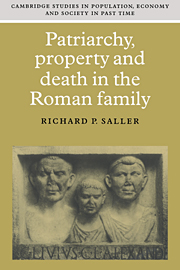Book contents
- Frontmatter
- Contents
- List of tables
- Preface
- Abbreviations
- 1 Introduction: approaches to the history of the Roman family
- Part I Roman life course and kinship: biology and culture
- Part II Roman family and culture: definitions and norms
- Part III The devolution of property in the Roman family
- 7 Strategies of succession in Roman families
- 8 Guardianship of Roman children
- 9 Dowries and daughters in Rome
- 10 Conclusion
- Bibliography
- Index
- Cambridge Studies in Population, Economy and Society in Past Time
10 - Conclusion
Published online by Cambridge University Press: 23 November 2009
- Frontmatter
- Contents
- List of tables
- Preface
- Abbreviations
- 1 Introduction: approaches to the history of the Roman family
- Part I Roman life course and kinship: biology and culture
- Part II Roman family and culture: definitions and norms
- Part III The devolution of property in the Roman family
- 7 Strategies of succession in Roman families
- 8 Guardianship of Roman children
- 9 Dowries and daughters in Rome
- 10 Conclusion
- Bibliography
- Index
- Cambridge Studies in Population, Economy and Society in Past Time
Summary
From Jean Bodin to Lewis Morgan to contemporary scholars, Rome has provided the paradigm of patriarchy in western thought. The paterfamilias, with his unlimited legal powers over members of his familia, has been interpreted as the extreme case in which “ paternal authority passed beyond the bounds of reason into an excess of domination.” Family relationships are often conceptualized as falling somewhere along a spectrum from afrectionless power at one end to loving concern at the other, and the movement along the spectrum is then historicized as social development. The Roman father, who in legend would execute his disobedient son without flinching, is taken to represent afrectionless power – the starting point from which the affectionate family gradually evolved.
My study has suggested the inadequacy of such a simple evolutionary view of family history. The Roman family was unquestionably patriarchal, in the sense that it was defined with reference to the father, who was endowed with a special authority in the household. But, I have argued, the characterization of an “excess of domination” has been the result of both a misinterpretation of the legends and, above all, an overly legalistic approach to the family. The law endowed the pater with a striking potestas encompassing extensive coercive and proprietary rights, yet a purely legal understanding of the Roman family is as incomplete and misleading as would be a solely legal understanding of the twentieth-century family. In certain circumstances, to be sure, legal rights and powers were important in determining the nature of family interactions, but in many other contexts the Romans appear to have been as oblivious to formal legal definitions of power in the family as we are today.
- Type
- Chapter
- Information
- Patriarchy, Property and Death in the Roman Family , pp. 225 - 232Publisher: Cambridge University PressPrint publication year: 1994



